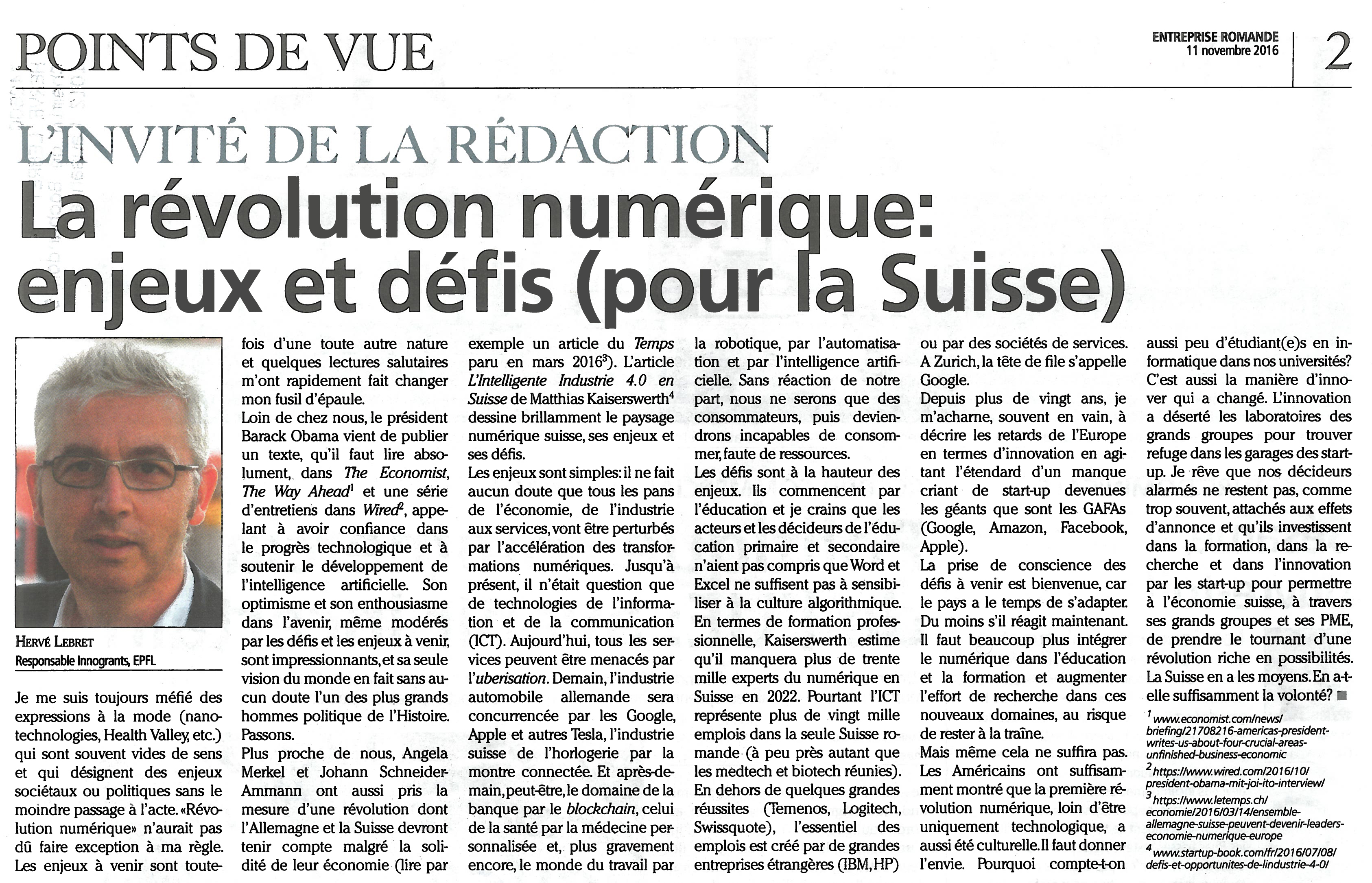My latest contribution to Enterprise Romande, this time about the digital revolution. Below is my “quick and dirty” translation.
I have always been suspicious of fashionable expressions and buzzwords (nanotechnologies, Health Valley, etc.) that are often meaningless and refer to societal or political issues without inducing the slightest change. “Digital Revolution” should not have been an exception to my rule. But the stakes ahead are of a completely different nature and a few salutary readings quickly made me change my mind.
Far from home, President Barack Obama has just published in The Economist a text, which must be read absolutely, the Way Ahead [1] and a series of interviews in Wired [2] calling for confidence in technological progress and for supporting the development of artificial intelligence. His optimism and enthusiasm for the future, even moderated by the challenges and stakes ahead, are impressive and his only vision of the world makes him undoubtedly one of the greatest leaders in history.
Closer to us, Angela Merkel and Johann Schneider-Ammann also took the measure of a revolution which Germany and Switzerland will have to take into account despite the solidity of their economy (see [3] for example). The article “Smart Industry 4.0 in Switzerland” by Matthias Kaiserswerth [4] brilliantly describes the Swiss digital landscape, the stakes and the challenges.
The stakes are simple: there is no doubt that all sectors of the economy, from industry to services, will be affected, not to say “disrupted” by the acceleration of digital transformations. So far, only information and communication technologies (ICT) have been impacted. But today all services can be threatened by the “uberization”. And tomorrow the German automotive industry will be challenged by the Googles, Apples and other Teslas of the world, the Swiss watch industry by the connected watch. And the day after tomorrow, perhaps, bank services by blockchain, health services by personalized medicine and even more seriously the world of labor by robotics, automation and artificial intelligence. Without any reaction from us, Europeans, we will become consumers only, then unable to consume due to lack of resources.
The challenges are up to what is at stake. They start with education and I fear that the actors and decision-makers in primary and secondary education have not understood that Word and Excel are not enough to raise awareness about the algorithmic culture. In terms of vocational training, Kaiserswerth estimates that there will be a shortage of over 30,000 digital experts in Switzerland in 2022. Yet ICT represents more than 20,000 jobs in French-speaking Switzerland alone (in fact about as much as Medtech and Biotech together). But except some great success stories (Temenos, Logitech, Swissquote), most jobs are created by large foreign companies (IBM, HP) or service companies. In Zurich, the leader is called Google. For more than 20 years I have been trying, often unsuccessfully, to describe Europe’s innovation gaps by shaking the banner of a shortage of start-ups that have become such giants as the GAFAs.
An awareness of the challenges ahead is welcome as the country has time to adapt. At least if we react now. Much more needs to be done to integrate digital technologies in education and training and to increase the research effort in these new fields, at the risk of lagging behind. But even this will not be enough. The Americans have sufficiently shown that the first digital revolution, far from being solely technological, was also cultural. We must stimulate the desire. Why are there so few computer science students in our universities? Innovation itself has drastically changed. Innovation has deserted the laboratories of large groups to find refuge in the start-up garages. I dream that our alarmed decision makers do not remain as too often attached to short-term messages and invest in education, research and innovation by start-ups to enable the Swiss economy with its large corporations and many SMEs to adapt to a revolution rich in opportunities. Switzerland has the means. Does it have the will?
[1] http://www.economist.com/news/briefing/21708216-americas-president-writes-us-about-four-crucial-areas-unfinished-business-economic
[2] https://www.wired.com/2016/10/president-obama-mit-joi-ito-interview/
[3] https://www.letemps.ch/economie/2016/03/14/ensemble-allemagne-suisse-peuvent-devenir-leaders-economie-numerique-europe
[4] https://www.startup-book.com/2016/07/08/challenges-and-opportunities-of-industry-4-0/

